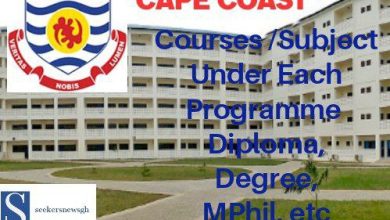2024 M.Phil Mathematics Education ( Regular) Courses ; University of Cape Coast
We’ve realized Students stay away from certain courses because they seem not to know the details, seekersnewsgh has dedicated this section to bring to you all available courses under the various programmes at the University. Kindly go through it to make an informed decision.
CHECK ALL COURSES AND THEIR OUTLINE
HOME
More information can be obtained from the University
MATHEMATICS EDUCATION
Degree Type:
Master of Philosophy
Department:
Department of Mathematics and ICT Education
Modes of Study:
Regular
About Programme:
But I must explain to you how all this mistaken idea of denouncing pleasure and praising pain was born and I will give you a complete account of the system, and expound the actual teachings of the great explorer of the truth, the master-builder of human happiness. No one rejects, dislikes, or avoids pleasure itself, because it is pleasure, but because those who do not know how to pursue pleasure rationally encounter consequences that are extremely painful.
Entry Requirements:
Applicants to the Master of Philosophy (Mathematics Education) programme should be”
(a) holders of B.Ed. (Mathematics Education) or B.Ed. (Mathematics) or B.Ed. Basic Education (Mathematics Option) with second class lower or better from a recognised university or
(b) holders of B.Sc. (Hons.) in mathematics or a mathematics related programme and a Postgraduate Certificate in Education (PGCE)/Postgraduate Diploma in Education (PGDE) In addition, a minimum of two years’ experience of mathematics teaching at the basic, high school or college level will be required. Applicants will also have to pass a selection interview for admission into the programme.
Career Opportunities:
The programme will equip students with skills to demonstrate an understanding of theories and pedagogical approaches underpinning current trends in the teaching of Mathematics Education. It will also equip students with skills that will enable them to engage in research in Mathematics Education.
Programme Structure
Level 800
First Semester
EMA 801: PHILOSOPHY OF MATHEMATICS
3 Credit(s)
The course will examine various philosophies of mathematics and their implications for their definitions of mathematics, the development of mathematics,
the structure and nature of some branches of mathematics, abstraction, symbolism, induction, deduction, mathematical logic, proofs and models in mathematics.
EMA 802: THEORETICAL BASIS FOR TEACHING MATHEMATICS
3 Credit(s)
This course will examine various psychological theories which underpin effective teaching and learning of mathematics.
EMA 805: RESEARCH METHODS IN MATHEMATICS EDUCATION
3 Credit(s)
The course aims to develop knowledge and skills of mathematics educators who are able to conduct research to improve teaching and learning in schools and other educational settings
EMA 806: ADVANCED ASSESSMENT IN MATHEMATICS EDUCATION
3 Credit(s)
The course is intended to deal with the assessment of cognitive, psychomotor and affective development of students and perspectives of assessment of mathematics teaching and learning
EMA 851: STATISTICAL METHODS IN MATHEMATICS EDUCATION
3 Credit(s)
This course is a balanced study between theoretical researched-based foundations and applications of statistical methods for analyses of quantitative and qualitative research data.
Second Semester
EMA 803: DEVELOPMENT OF CURRICULUM IN MATHEMATICS EDUCATION
3 Credit(s)
This course is designed to expose students to contemporary issues in curriculum studies and development in mathematics education.
EMA 804: RESEARCH IN PROBLEM SOLVING IN MATHEMATICS EDUCATION
3 Credit(s)
The course will explore various notions of problems, problem-solving, problem posing, and teaching of problem solving from multiple research perspectives.
EMA 806: ADVANCED STUDY OF TEACHING ELEMENTARY SCHOOL MATHEMATICS
3 Credit(s)
The course aims to provide a detailed study and evaluation of recent research developments within the fields of learning, perception and cognition,
and guide students to consider the implications of these recent advances on mathematics instruction.
EMA 809: SAMPLING TECHNIQUES AND SURVEY
3 Credit(s)
This course focuses on the application of statistical methods to educational problems
EMA 812: COMPUTER APPLICATION IN MATHEMATICS EDUCATION
3 Credit(s)
The course will provide students’ opportunities to develop their Technological Pedagogical Content Knowledge (TPACK) and skills to design, enact and evaluate ICT-based lessons using a variety of ICT tools that support different teaching and learning strategies. Students will gain enough computer knowledge such as Office Suite, EndNotes, Qualitative and Quantitative Data Analysis software to complete their thesis and oral examination


The problem is the basic teacher will not be granted the leave to pursue the course which is regular.
I suggest if the Mphil courses can be round in weekend, distances ,sandwich base if I think alot of teachers can pursue
Please I need that of ICT
https://seekersnewsgh.com/courses-under-m-ed-information-technology-regular-university-of-cape-coast/
Pls when will the forms for masters be out?